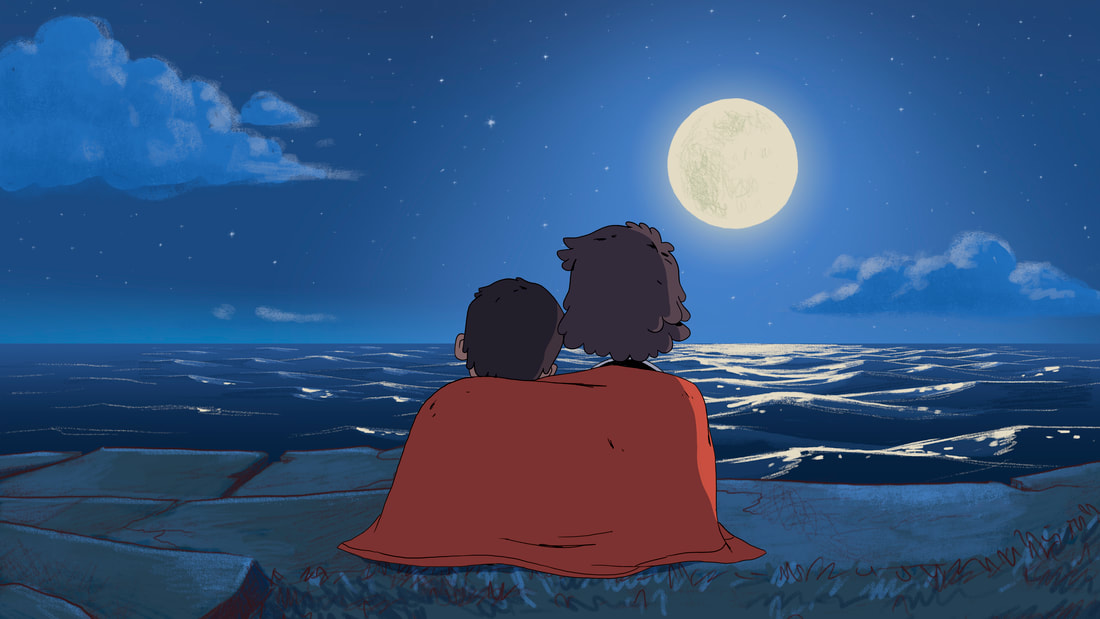|
I chat with the amazing Colin Babcock about the fantastic short Mindbender The Cow! creatics.org/cinejoy/moviepage/140700#!#pills-all
8 Comments
Music has the power to bring about change, not only in the heart, but in the world. Animation, perhaps the most empathic of all film forms, has a similar ability, and one that has been used for both ill and good. When the two come together, there is a magic, and that’s what happens with the magnificent short film Footsteps on the Wind. Let’s start with the music. Sting, that fellow from The Police and the only good film version of Dune, created an amazing song called Inshallah that is incredibly powerful. It’s a song about refugees fleeing, arriving in a new land after leaving war and strife behind them. Inshallah means “if Allah wills it” and is an exclamation used quite frequently in the Islamic world, and not only among Muslims. Sting’s song is beautiful, as a lot of his more recent work has been. Of the song, Sting said, “It’s driven by warfare in the Middle East. It’s driven by poverty in Africa. It may be driven by climate change in the very near future. It’s not going to be something we can hope to end tomorrow. I don’t have a political solution, but I feel if there’s a solution to it, it has to be grounded in some kind of empathy for those people in those boats.” He’s right, and empathy is often developed through the arts. Inshallah is the kind of song that can do that to you, bring your attention to something that you’ve likely heard reported on in that annoying journalistic way that presents suffering as a thing that happens, instead of as a thing that happens to actual humans who have feelings, lives, and loves. This range of experiences is communicated by those who create works of art far better than by journalists. Animation can communicate that even better. It’s through the creation of an entire world that we are best able to focus our attentions on the things that matter emotionally. Everything you see in an animation is the product of human beings who are trying to tell a story, and to tell that story, they can excise the elements that don’t bring about the reaction they need. It is not the world as we know it, but as it might be, as it might feel, as it might become. In the amazing Footsteps on the Wind, it is also the element of empathy that is being developed, the sensation of viewing the suffering of refugees as presented in the tribulation displayed, but more than that, these characters, they’re humans. They establish this easily, naturally, by showing life, picking an orange, kids playing, a sweet scene. Then the ground opens, and the trial begins. The animation style is lovely, comic book influenced and clean. We are presented with a fantastical world, one of beauty and horrors, but ultimately, one of emotions, and while this can often lead to a terrible amount of manipulation, here, that is not only not the case, but it pulls back just enough to make the story the star. It’s beautiful, and the relationships between the family as they move through the world they have been dropped in are authentic. I know this feeling, though I’ve never experienced it for the reasons or in the ways of a refugee, but I understand that my nugget of understanding was a painful experience, and imagine the ramping up. The short was actually developed with the help of refugees themselves participating in workshops. Director (and amazing human being!) Maya Sanbar shared a bit about the intention and process of the film with me - We really want it to be used as a therapy tool. We've found ways working with psychologists to trigger talking points in a way that is tough, but not traumatic: for example the octopus ink hands are about children being kidnapped, disappearing, 400 000 of them unaccounted for, says UNHCR. War was an earthquake instead of bombs so that it can also be related to any form of displacement. I'm also keen to get it into schools to talk about displacement, loss, resilience and hope. I remember the professor in my History of Islam class at Emerson saying, simply, “those displaced by war are first displaced from their comfort,” and the minute I finished Footsteps on the Wind, I understood it fully, and could not shake a feeling. The feeling that those in the story were not only people who had gone through a trauma, but that they’re feelings, emotions, sensations were no different than mine. We were, in fact, not just the same species, but of the same tribe. My circle had widened; the people of the world came closer. It was an empathic experience, and one that I hope many get to experience. I asked Maya for a quote, and she sent this wonderful message - "Animation allows symbolism and space for the viewer’s imagination to transgress words: there are many layers to uncover in the treasure hunt of clues within the script. We’ve taken fairytale references like Alice in Wonderland, Jack and the Beanstalk, Wizard of Oz, Hansel and Gretel, age old stories that are sometimes scary, but they help find ways of dealing with trauma. And making this about all kinds of loss and resilience, whether within or outside of the depths of the refugee experience, was important for us as it’s conceived as a storytelling tool for trauma therapy.”
|
Klaus at GunpointA Film Journal dedicated to all film.A segment of Office Supply Publishing. Archives
March 2021
Categories
All
|
||||||||


 RSS Feed
RSS Feed